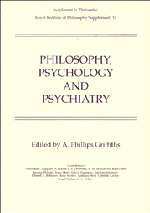Book contents
- Frontmatter
- Contents
- Preface
- Introduction: Just Getting Started
- Mind and Madness: New Directions in the Philosophy of Psychiatry
- Emotion and Memory: The Second Cognitive Revolution
- Meaning and Mechanism in Psychotherapy and General Psychiatry
- Making Sense on the Boundaries: On Moving Between Philosophy and Psychotherapy
- Mental Disorder, Illness and Biological Disfunction
- Integrity, Boundary and the Ecology of Personal Processes
- Multiple Personality and Computational Models
- Psychology and Politics: Lies, Damned Lies and Self-Deception
- Personal Identity and Psychiatric Illness
- Vices and the Self
- Wild Beasts and Idle Humours: Legal Insanity and the Finding of Fault
- Dangerousness and Mental Disorder
- Problems with the Doctrine of Consent
- Homosexuality
- Nietzsche and Music
- References
- Notes on Contributors
Nietzsche and Music
Published online by Cambridge University Press: 03 May 2011
- Frontmatter
- Contents
- Preface
- Introduction: Just Getting Started
- Mind and Madness: New Directions in the Philosophy of Psychiatry
- Emotion and Memory: The Second Cognitive Revolution
- Meaning and Mechanism in Psychotherapy and General Psychiatry
- Making Sense on the Boundaries: On Moving Between Philosophy and Psychotherapy
- Mental Disorder, Illness and Biological Disfunction
- Integrity, Boundary and the Ecology of Personal Processes
- Multiple Personality and Computational Models
- Psychology and Politics: Lies, Damned Lies and Self-Deception
- Personal Identity and Psychiatric Illness
- Vices and the Self
- Wild Beasts and Idle Humours: Legal Insanity and the Finding of Fault
- Dangerousness and Mental Disorder
- Problems with the Doctrine of Consent
- Homosexuality
- Nietzsche and Music
- References
- Notes on Contributors
Summary
Friedrich Wilhelm Nietzsche was born on 5 October 1844 and died on 25 August, 1900. From 1889 until his death eleven years later he was physically and mentally ill and incapable of work. It is almost certain that he died of the brain disease known as G.P.I., General Paralysis of the Insane, or general paresis. In the nineteenth century and well into our own era, this was a not uncommon tertiary manifestation of a syphilitic infection which might originally have been contracted many years before. Because the initial stages of syphilis can now be treated with antibiotics, general paresis is rarely seen today.
Nietzsche became involved with music at a very early age. His father, a Lutheran minister, was a musical enthusiast and organised performances of Handel's Messiah and other works for his congregation. He also played the piano, and was particularly skilled at improvisation, as Nietzsche himself became. Unfortunately, Nietzsche's father died a few months before the child's fifth birthday. In an autobiographical sketch, Nietzsche wrote that his father became mentally ill before he died. In fact, if for once we may believe the testimony of Nietzsche's sister Elisabeth, the precipitant of his illness was a head injury caused by a fall on the steps of his house in September 1848. He died on 30 July 1849 after a fluctuating illness characterised by severe pain and terminal blindness. When his skull was opened, the doctor's diagnosis of ‘softening of the brain’ was confirmed.
- Type
- Chapter
- Information
- Philosophy, Psychology and Psychiatry , pp. 213 - 228Publisher: Cambridge University PressPrint publication year: 1995



